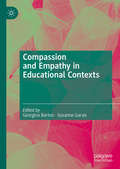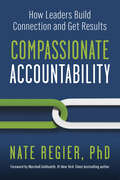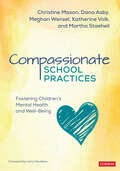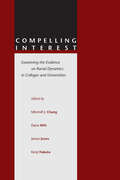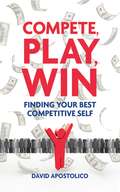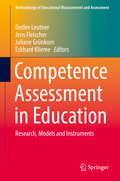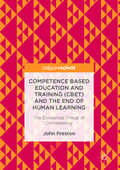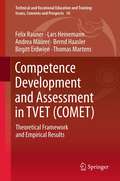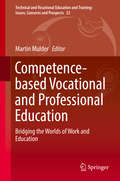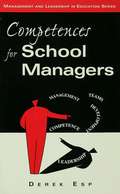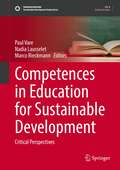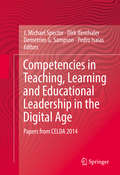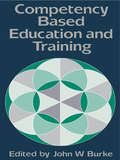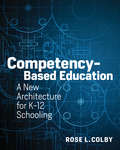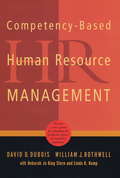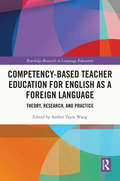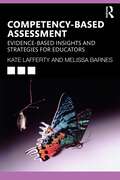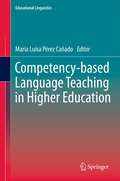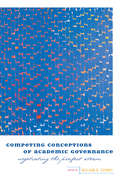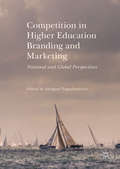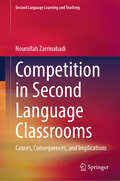- Table View
- List View
Compassion and Empathy in Educational Contexts
by Susanne Garvis Georgina BartonThis book explores the importance of compassion and empathy within educational contexts. While compassion and empathy are widely recognised as key to living a happy and healthy life, there is little written about how these qualities can be taught to children and young people, or how teachers can model these traits in their own practice. This book shares several models of compassion and empathy that can be implemented in schooling contexts, also examining how these qualities are presented in children’s picture books, films and games. The editors and contributors share personal insights and practical approaches to improve both awareness and use of compassionate and empathetic approaches to others. This book will be of interest and value to all those interested in promoting compassion and empathy within education.
Compassionate Accountability: How Leaders Build Connection and Get Results
by Nate Regier PhDA compass for leaders lost in the paradoxical space between attention to people and attention to results—with Compassionate Accountability you don't have to choose! Sadly, compassion and accountability are too often in tension-leaders feel they have to pick one or the other. But solely prioritizing accountability can create toxic work environments that drive away good talent. On the other end of the spectrum, being too nice can compromise performance and productivity.Finding harmony between compassion and accountability is the ultimate catalyst for improved results and a thriving workplace. The solution is recognizing that compassion and accountability are not opposites. In fact, accountability is an element of compassion. Compassionate Accountability is the process of building connection while getting results. This book shows how this foundational mindset, philosophy, and way of living can lead to a thriving organizational culture. It covers such topics as these: Why you can't practice compassion without accountabilityHow to turn on the three switches of the compassion mindset—and the predictable damaging consequences when they're turned offThe key role Compassionate Accountability plays in a healthy leadership culture Six areas to focus on to start building your culture of Compassionate AccountabilityFive common barriers to compassion for leaders—and how to overcome themPlus, readers will find real case examples of how organizations have adopted Compassionate Accountability, along with quizzes and self-assessments to help them learn and apply the concepts. Leaders seeking a renewed sense of fulfillment in their roles and increased leadership impact will find inspiration, guidance, and a road map for cultural transformation.
Compassionate School Practices: Fostering Children′s Mental Health and Well-Being
by Christine Y. Mason Dana Asby Meghan Wenzel Katherine T. Volk Martha StaeheliAlready Ready For What Will Come - SEL For A Culture Of Care Is your school prepared to care for all of the students, staff, and families in your community? Sadly, your school might be the only point of care for many. Be already ready--Establish a compassionate cultural foundation for strong relationships and holistic skills to weather stress, trauma, and promote well-being for your entire school population. Help your school or district use available resources to create a compassionate culture of justice and care for all by leaning into this book’s approach to leadership and social emotional learning. Discover a collaborative visioning process to elevate compassion through dialogue, policies, and protocol. Readers will find: Practical strategies for working with parents and communities Activities for the whole school An implementation framework for elementary, middle, and high school Deeper understanding of trauma, ACEs, and mental health concerns Support for teachers’ mental health What not to do – practices that don’t work, and why In-depth case studies and vignettes Read this and usher in transformational and compassionate change that may be the difference in whatever today, tomorrow, or the next day may bring.
Compassionate School Practices: Fostering Children′s Mental Health and Well-Being
by Christine Y. Mason Dana Asby Meghan Wenzel Katherine T. Volk Martha StaeheliAlready Ready For What Will Come - SEL For A Culture Of Care Is your school prepared to care for all of the students, staff, and families in your community? Sadly, your school might be the only point of care for many. Be already ready--Establish a compassionate cultural foundation for strong relationships and holistic skills to weather stress, trauma, and promote well-being for your entire school population. Help your school or district use available resources to create a compassionate culture of justice and care for all by leaning into this book’s approach to leadership and social emotional learning. Discover a collaborative visioning process to elevate compassion through dialogue, policies, and protocol. Readers will find: Practical strategies for working with parents and communities Activities for the whole school An implementation framework for elementary, middle, and high school Deeper understanding of trauma, ACEs, and mental health concerns Support for teachers’ mental health What not to do – practices that don’t work, and why In-depth case studies and vignettes Read this and usher in transformational and compassionate change that may be the difference in whatever today, tomorrow, or the next day may bring.
Compelling Interest: Examining the Evidence on Racial Dynamics in Colleges and Universities
by James Jones Daria Witt Kenji Hakuta Mitchell ChangIn recent years American colleges and universities have become the locus of impassioned debates about race-conscious social policies, as conflicting theories clash over the ways to distribute the advantages of higher education in a fair and just manner. Just below the surface of these policy debates lies a complex tangle of ideologies, histories, grievances, and emotions that interfere with a rational analysis of the issues involved. As never before, the need for empirical research on the significance of race in American society seems essential to solving the manifest problems of this highly politicized and emotionally charged aspect of American higher education. The research evidence presented in this book has a direct relevance to those court cases that challenge race-conscious admission policies of colleges and universities. Though many questions still need to be addressed by future research, the empirical data collected to date makes it clear that affirmative action policies do work and are still very much needed in American higher education. This book also provides a framework for examining the evidence pertaining to issues of fairness, merit, and the benefits of diversity in an effort to assist courts and the public in organizing beliefs about race and opportunity.
Compendio: La historia humana narrada a través de nuestros genes
by Adam RutherfordEl poder del ADN y la información que contiene, son inmensos. Imagine usar esa información para descubrir nuestro pasado. En nuestros genomas, cada uno de nosotros llevamos la historia de nuestra especie: nacimientos, fallecimientos, enfermedades, guerra, hambruna, migración y sexo. Somos mucho más que nuestro ADN, pero este contiene la llave de nuestro pasado. "Esta es una historia acerca de usted. Trata sobre la historia de quién es usted y cómo llegó a ser lo que es" - Adam Rutherford.
Compensation Claims Clerk: Passbooks Study Guide (Career Examination Series)
by National Learning CorporationThe Compensation Claims Clerk Passbook® prepares you for your test by allowing you to take practice exams in the subjects you need to study. It provides hundreds of questions and answers in the areas that will likely be covered on your upcoming exam.
Compete, Play, Win: Finding Your Best Competitive Self
by David ApostolicoThis book is a sociological examination of competition and the competitive drive, told from the viewpoint of a competition freak. The author explores the energy and force behind the need to compete, and what the consequence of that need is. In the chapter "Sperm Wars," Apostolico discusses conception as the beginning of the competitive nature of humans, while also discussing the competition for a mate that precedes it. Through this, he sets up the idea of a biological necessity for competition and how evolution has modified and enhanced that drive. In a later chapter called "Competitive Nature," Apostolico participates in as many competitive endeavors as possible (eating contests, drag races, dog shows, etc.) and answers a set of 10 questions about each, concluding with, "Can a competitive junkie ever truly feel satisfied?"
Competence Assessment in Education: Research, Models and Instruments (Methodology of Educational Measurement and Assessment)
by Eckhard Klieme Detlev Leutner Jens Fleischer Juliane GrünkornThis book addresses challenges in the theoretically and empirically adequate assessment of competencies in educational settings. It presents the scientific projects of the priority program "Competence Models for Assessing Individual Learning Outcomes and Evaluating Educational Processes," which focused on competence assessment across disciplines in Germany. The six-year program coordinated 30 research projects involving experts from the fields of psychology, educational science, and subject-specific didactics. The main reference point for all projects is the concept of "competencies," which are defined as "context-specific cognitive dispositions that are acquired and needed to successfully cope with certain situations or tasks in specific domains" (Koeppen et al. , 2008, p. 62). The projects investigate different aspects of competence assessment: The primary focus lies on the development of cognitive models of competencies, complemented by the construction of psychometric models based on these theoretical models. In turn, the psychometric models constitute the basis for the construction of instruments for effectively measuring competencies. The assessment of competencies plays a key role in optimizing educational processes and improving the effectiveness of educational systems. This book contributes to this challenging endeavor by meeting the need for more integrative, interdisciplinary research on the structure, levels, and development of competencies.
Competence Based Education and Training (CBET) and the End of Human Learning: The Existential Threat of Competency
by John PrestonThis book radically counters the optimism sparked by Competence Based Education and Training, an educational philosophy that has re-emerged in Schooling, Vocational and Higher Education in the last decade. CBET supposedly offers a new type of learning that will lead to skilled employment; here, Preston instead presents the competency movement as one which makes the concept of human learning redundant. Starting with its origins in Taylorism, the slaughterhouse and radical behaviourism, the book charts the history of competency education to its position as a global phenomenon today, arguing that competency is opposed to ideas of process, causality and analog human movement that are fundamental to human learning.
Competence Development and Assessment in TVET: Theoretical Framework and Empirical Results (Technical and Vocational Education and Training: Issues, Concerns and Prospects #16)
by Felix Rauner Lars Heinemann Andrea Maurer Bernd HaaslerThe transferability of vocational education and training qualifications across international borders is a live issue in this heterogeneous field. Key to this goal is defining a common methodology for measuring vocational competences. This publication sets out a proposal for just that, based on the results of a pilot project known as 'COMET' on competence diagnostics in the field of electrical engineering. The study deploys longitudinal analysis to explore issues of competence development, the development of vocational identity, and occupational commitment. It focuses on two discrete occupational profiles in electrical engineering in an ambitious test of a model currently applied to other professions as well. The model's success in its first phase is detailed in the second part of the volume, where the authors show that the transfer of the competence framework into an empirical model was successful. They also demonstrate that the methodology can be applied to designing and evaluating vocational education and training processes, making the material relevant to VET teachers and trainers as well as academics. With its first section comprising a full description of the theoretical framework, this book is a significant step forward in an urgent task facing administrations, labor forces and employers around the world. The achievement is in proportion to the notorious complexities of a field whose diversity makes tough demands on large-scale methods of assessment.
Competence-based Vocational and Professional Education: Bridging the Worlds of Work and Education (Technical and Vocational Education and Training: Issues, Concerns and Prospects #23)
by Martin MulderThis book presents a comprehensive overview of extant literature on competence-based vocational and professional education since the introduction of the competence concept in the 1950s. To structure the field, the book distinguishes between three approaches to defining competence, based on 1. functional behaviourism, 2. integrated occupationalism, and 3. situated professionalism. It also distinguishes between two ways of operationalizing competence: 1. behaviour-oriented generic, and 2. task-oriented specific competence. Lastly, it identifies three kinds of competencies, related to: 1. specific activities, 2. known jobs, and 3. the unknown future. Competence for the unknown future must receive more attention, as our world is rapidly evolving and there are many glocal challenges which call for innovation and a profound transformation of policies and practices. The book presents a range of different approaches to competence-based education, and demonstrates that competence-based education is a worldwide innovation, which is institutionalized in various ways. It presents the major theories and policies, specific components of educational systems, such as recognition, accreditation, modelling and assessment, and developments in discipline-oriented and transversal competence domains. The book concludes by synthesizing the different perspectives with the intention to contribute to further improving vocational and professional education policy and practice. "
Competences for School Managers (Management And Leadership In Education Ser.)
by Esp, DerekThis study examines the development of competency approaches for school management in the UK. Using examples of current attempts to apply competency models for staff selection and professional development in education, it provides practical suggestions for the everyday use of these models.
Competences in Education for Sustainable Development: Critical Perspectives (Sustainable Development Goals Series)
by Paul Vare Marco Rieckmann Nadia LausseletThis volume highlights key moments and movements in this "competence turn" in Education for Sustainable Development (ESD), and explores the different ways in which competences have been conceptualized and implemented. By marshaling a dialogue between chapters and sections, the book provides a coherent whole that will become a key source on ESD competences. The contributors develop a conceptual map against which to chart existing (and future) ESD competence frameworks, offer new critical case studies that explore the implementation of educator competences in ESD at different structural levels in different European contexts, explore the link between pedagogy and educator competence through hitherto unpublished case studies based on current practices across Europe, and consider the impact of the COVID-19 pandemic on ESD and educator competence. The book comprises 23 chapters divided into four sections, with an introduction and concluding chapter. Section One introduces concepts and models related to ESD competences, while the following two sections focus on implementation and pedagogy. In light of the foregoing material, the shorter Section Four is both reflective and forward looking. The primary audience for this book will be academics and students working in the fields of Education, Sustainability Science and related disciplines.
Competencies in Teaching, Learning and Educational Leadership in the Digital Age: Papers from CELDA 2014
by Dirk Ifenthaler J. Michael Spector Pedro Isaias Demetrios G. SampsonThis book makes a contribution to a global conversation about the competencies, challenges, and changes being introduced as a result of digital technologies. This volume consists of four parts, with the first being elaborated from each of the featured panelists at CELDA (Cognition and Exploratory Learning in the Digital Age) 2014. Part One is an introduction to the global conversation about competencies and challenges for 21st-century teachers and learners. Part Two discusses the changes in learning and instructional paradigms. Part Three is a discussion of assessments and analytics for teachers and decision makers. Lastly, Part Four analyzes the changing tools and learning environments teachers and learners must face. Each of the four parts has six chapters. In addition, the book opens with a paper by the keynote speaker aimed at the broad considerations to take into account with regard to instructional design and learning in the digital age. The volume closes with a reflective piece on the progress towards systemic and sustainable improvements in educational systems in the early part of the 21st century.
Competency Based Curriculum for Teachers of the Visually Handicapped
by Susan J. SpunginThis book is a guideline for teachers of the blind. Six basic types of education system now exist, and were examined for the purposes of this study: full-time special class, resource room, itinerant program, resource room/itinerant program, teacher consultant, and residential school.
Competency Based Education And Training
by John W. BurkeFirst published in 1989. Routledge is an imprint of Taylor & Francis, an informa company.
Competency-Based Education: A New Architecture for K-12 Schooling
by Rose L. ColbyCompetency-Based Education introduces educators to a new model for anytime, anywhere schooling and provides tools and curriculum resources for redesigning the traditional structures of K–12 schools. Based on pioneering work across multiple states, the book shows how educators can design central elements of competency-based education—including performance tasks, personal learning plans, and grading systems—to meet the needs and interests of all students. Rose L. Colby provides critical tools for creating these elements in collaborative teams and engaging stakeholders such as educators, parents, and community members. The book incorporates case studies and voices from the field, and examines the variety of competency models that schools have adopted, highlighting the benefits for students.Competency-Based Education provides a much-needed resource at a time when states, districts, and schools are working to implement competency-based models and experimenting with new accountability systems that include evidence of learning beyond standardized tests.
Competency-Based Human Resource Management: Discover a New System for Unleashing the Productive Power of Exemplary Performers
by William J. Rothwell Linda K. Kemp David D. Dubois Deborah Jo SternForce-fitting employees to job descriptions leads to unhappy people and substandard performance. For years, HR professionals have struggled with this dilemma. But it doesn’t have to be that way. Competency-Based Human Resource Management describes a new model of performance management that matches employee talents to the work that must be done. By focusing on the critical competencies that distinguish star performers, HR professionals can transform the way they recruit, select, train, develop, and compensate top-performing employees.
Competency-Based Teacher Education for English as a Foreign Language: Theory, Research, and Practice (Routledge Research in Language Education)
by Amber Yayin WangProviding a series of chapters, written by teacher educators in three continents, this edited volume explores the concepts, challenges, possibilities, and implementations of competency-based instruction for developing English competencies in English as a foreign language (EFL) contexts. Recent trends in education have emphasized the need to develop competencies that connect learning with real-life performances. This need has brought about a massive increase in the number of studies and scholarly works devoted to research into competency-based education. However, for teachers and learners of EFL, it is challenging to develop competencies for using a language that does not seem to connect with their real-life scenarios. The chapters apply the concept of competency-based instruction in different EFL contexts and are structured around three themes: Theory: current thoughts on theories of competency-based education Research: empirical research on competency-based teacher education Practice: integrating competency-based instruction into teacher education This book offers examples of competency-based EFL teacher education through both research and practical applications. In addition to the innovation in competency approaches, the inclusion of language learning in virtual environments offers a valuable resource for scholars, educators, researchers, and all those concerned with current and future education.
Competency-based Assessment: Evidence-based Insights and Strategies for Educators
by Melissa Barnes Kate LaffertyThis book is a practical, evidence-based guide for educators at all levels on how to assess and promote student learning, broadening teachers’ understanding of assessment. Balancing assessment with the development and promotion of student learning can be a significant challenge for teachers.This book provides the content, as well as practical guidance, to support educators in developing their understanding of assessment from task-driven, domain-bound content knowledge, towards the assessment of complex competencies. Supported by research, but not overwhelmed by it, the book provides practical strategies that can be applied in the classroom. The pedagogical structure of the book encourages self-guided learning, with each chapter providing opportunities for reflection to facilitate planning and goal setting, as well as quotes and vignettes from students and teachers highlighting their experiences of and perspectives on assessment.This book is a great resource for practising educators and postgraduate students who want to improve their understanding of assessment, implement it more effectively and support better outcomes for their students.
Competency-based Language Teaching in Higher Education (Educational Linguistics #14)
by María Luisa Pérez CañadoSpanning the divide between the theory and praxis of competency-based teaching in tertiary language education, this volume contains invaluable practical guidance for the post-secondary sector on how to approach, teach, and assess competencies in Bologna-adapted systems of study. It presents the latest results of prominent European research projects, programs of pedagogical innovation, and thematically linked academic networks. Responding to a profound need for a volume addressing the practical aspects of the newly designed language degrees now being rolled out across Europe, this essential contribution pools the insights of a prestigious set of scholars, practitioners, and policy makers from diverse parts of Europe and the US. It will inform crucial decisions about instituting and evaluating competencies in a new generation of language studies programmes.
Competing Conceptions of Academic Governance: Negotiating the Perfect Storm
by William G. TierneyToday, institutional leaders face numerous struggles: intervention from boards of trustees, alumni, and state legislators; decline in financial support from the states; and competition in an increasingly global marketplace. While it is agreed that effective governance structures allow institutions to respond creatively to these challenges, how best to allocate control in order to maximize institutional efficiency, preserve academic freedom, and ensure institutional identity remains unclear. Increasingly, administrators look to non-academic institutions for governance and management strategies.In Competing Conceptions of Academic Governance, William G. Tierney brings together faculty members, administrators, and policy experts to discuss differing views of academic governance at institutional, state, and international levels. Topics include the effects of globalization and the prospect of international accreditation; balancing the entrepreneurial and philosophical goals of higher education; the interaction between state governments and public universities; and the conflicting interests and roles of boards of trustees, administrators, and faculty. Carefully weighing various models and strategies, Competing Conceptions of Academic Governance provides new ways of understanding and addressing the changes that are transforming higher education.
Competition in Higher Education Branding and Marketing: National and Global Perspectives
by Antigoni PapadimitriouThis volume provides a critical examination of branding and marketing in higher education from national, regional, and global perspectives. Contributors with expertise in higher education, sociology, comparative and international education, marketing, rankings, and educational philanthropy use novel theoretical frameworks and cases from Africa, Asia, Europe, Latin America, and the US to map the brandscape of higher education. Empirical cases and literature analysis show that brand building is becoming a deliberate goal for higher education. This book illustrates student-institution dynamics, as well as the critical role of policy and professionalization to support branding and marketing strategies in higher education in relation to equity.
Competition in Second Language Classrooms: Causes, Consequences, and Implications (Second Language Learning and Teaching)
by Nourollah ZarrinabadiThis book offers an in-depth exploration of the causes and consequences of competition among language learners, with a particular focus on understanding the intricate relationships between competitiveness, beliefs about competition, and other psychological variables pertinent to language learning, such as motivation, anxiety, and mindsets. The initial chapters provide a comprehensive review of various competition theories and the latest empirical research on competition across diverse domains, including education and the workplace. Subsequently, the book qualitatively investigates the linguistic, psychological, educational, cultural, and contextual factors that contribute to competition in English language classrooms. It also delves into the potential psychological, educational, and personal outcomes of such competition in second language (L2) learning environments. Furthermore, this monograph scrutinizes the interplay between competition-related variables and the motivational and emotional dimensions of L2 learning. In its concluding sections, the book offers practical insights for language educators, guiding them on how to effectively manage competition among students to mitigate its adverse effects while leveraging its potential to enhance language learning and development.
